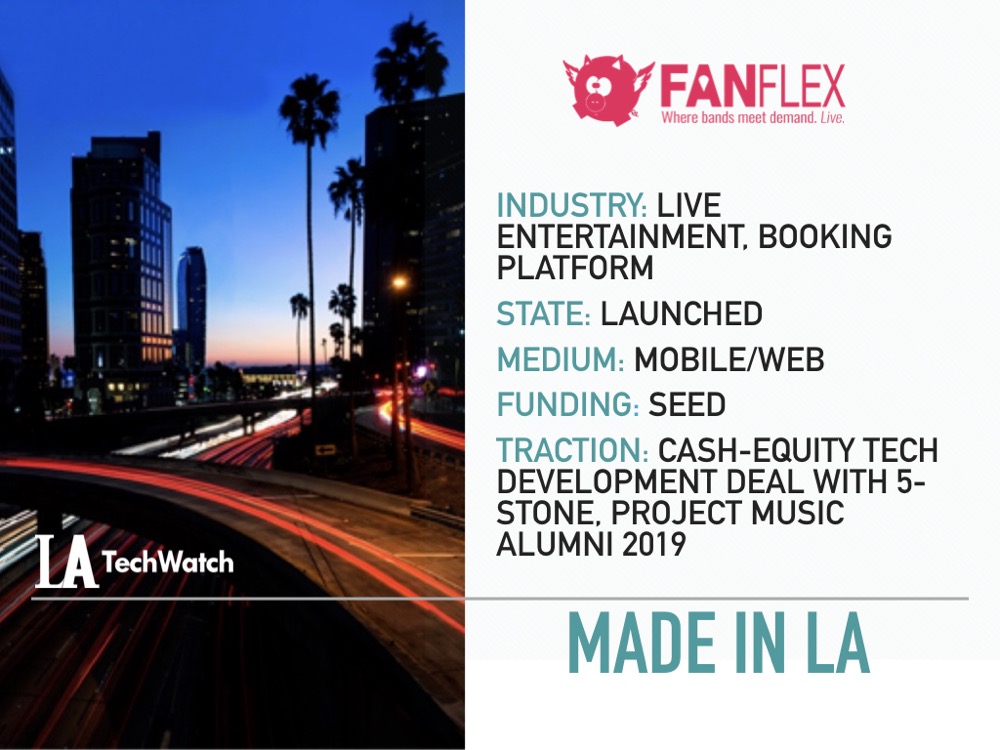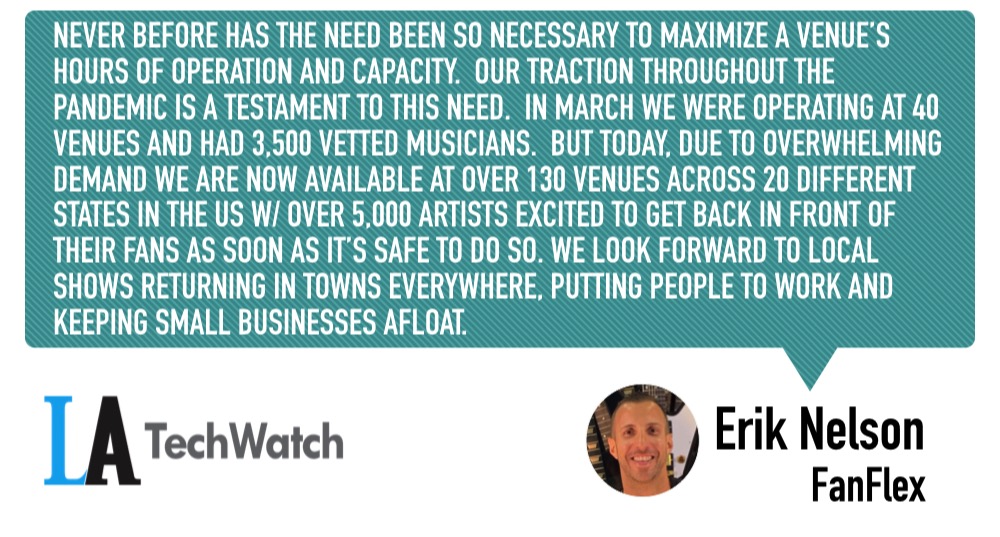10 Dec FanFlex Strengthens the Relationship Between Venues and Musicians Through its Booking Platform
BY LA TECHWATCH

For independent musicians, finding and securing a venue for your next performance is difficult and time-consuming, and there is no guarantee that you’ll leave at the end of the night with a pocket of cash. FanFlex is the do-it-yourself booking platform that allows venues to list their space and availability dates, allowing musicians to easily book venues and sell tickets directly to fans through the FanFlex platform. The two-sided marketplace lets venues shift their focus from selling tickets to maximizing food and beverage revenue, while the musician controls the ticket sales. Despite the pandemic affecting in-person activity, FanFlex is being used by more than 130 venues across the US and has 5K+ artists on its platform.
LA TechWatch caught up with Cofounder Erik Nelson to learn more about FanFlex and how his background in the entertainment industry served as the genesis for the platform.
Tell us about the product or service Fan Flex offers
Like a hotel or airline deal site that solves the problem of available inventory, FanFlex does the same but for the live music business. Just as easy as it is for hotels to upload their open rooms on such platforms, FanFlex allows venues to upload their open dates onto our platform so that Artists can fill empty time slots by meeting basic parameters set by the venues. Venues can now focus on maximizing their food and beverage sales and no longer have to worry about losing money on shows. Artists simply promote potential shows across social media driving their fans to “Flex” tickets to shows they want to play. Once their campaign meets parameters set by the venue, the show is officially booked, and the artist gets to keep 100% of the ticket money they generate – a direct fan to band payment.
Tell us a little about your background and what inspired the business?
I’ve spent 20 years working in the music industry specifically in live music and entertainment.
Through this experience, I observed a real need for a tool that minimizes risk and increases revenue for musicians and venues alike, while giving fans more control throughout the purchasing process. After speaking about this idea with my long-time college friend, Gian Perugini, we decided to launch FanFlex.
Gian recognized that FanFlex could also be an invaluable resource for non-traditional music venues across the country and the millions of independent musicians who fill these venues’ stages on a nightly basis.
We have grown FanFlex into a national platform covering 20 states and serving 5,000+ artists around the country.
How is FanFlex different?
FanFlex has built a DIY booking platform that is available in any city in the US for any independent venue that needs help bringing patrons back in the door. It allows venues everywhere in the US to upload empty calendar dates and availability so that performing musicians will be able to know that their doors and stages are open. These artists can now safely fill these venues with their music and fanbases. Venues can save time and effort by relying on FanFlex’s family of 5,000+ vetted artists that are ready to fill their empty calendar with guaranteed fan attendance. Other platforms in our space currently do not solve the problem from the venue standpoint. As we enter a post-COVID world, FanFlex allows venues to better target their marketing by taking the uncertainty out of booking shows. Artists are able to grow their career within depth data analytics on the people that are spending money to see them perform thanks to direct band-to-fan ticketing.
What market are you attacking and how big is it?
Before COVID-19, the US Live Music Industry was set to grow to $24.5B by 2021. Yet, these numbers were based only on venues and artists that report their data to services like Pollstar, and do not account for the 80,000 small independently owned venues (data gathered from Pollstar, indieonthemove, Yelp, Google) hosting live music to the over 4.5 million independent artists playing at these venues daily (data based on artists accounts on Reverbnation). As cities across the country start to reopen their economies the US Live Music Industry is set to rebound and FanFlex is there to be an essential tool for small venues looking to maximize revenue streams and streamline their businesses.
What is the business model?
FanFlex has a number of ways to monetize these relationships between the small independently owned venues, artists, and fans. From analytics to advertising, to pro subscriptions and more, we are creating a viable and repeatable economic model built upon these booking and performance interactions.
Our business model includes:
- FanFlex makes money when Artists and Venues make money through profitable shows rather than relying on ticketing fees.
- User Acquisition – Social media marketing, Distribution partners/cross-promotion, Word of mouth, Newsletter
- Subscription fees – Monthly venue subscription fee, different account types for artists such as access to show history and fan analytics
- Flex fee – Non-Recurring Booking fee of 12.5% for artists that don’t hit venue minimum threshold
- Advertising
How has COVID-19 impacted the business?
As venues reopen their doors in a post-COVID world, never before has the need been so necessary to maximize a venue’s hours of operation and capacity. Our traction throughout the pandemic is a testament to this need. In March we were operating at 40 venues and had 3,500 vetted musicians. But today, due to overwhelming demand we are now available at over 130 venues across 20 different states in the US w/ over 5,000 artists excited to get back in front of their fans as soon as it’s safe to do so. We look forward to local shows returning in towns everywhere, putting people to work, and keeping small businesses afloat.

Tell us what building your company in LA has been like?
Having been born and raised in Los Angeles and growing up going to shows across the area, it’s been great to now be an integral part of so many of the marquee venues in town. I’ve been a part of the live music business and experience since high school, and it’s always been important to me to make sure shows are profitable for the venue and successful for the performer.
Seeing firsthand how the industry works, it has always been integral to the philosophy of FanFlex to create a platform that levels the playing field, removes gatekeepers, and tears down roadblocks. We have proven that the drive to produce profitable nights at venues can coexist with fair opportunities to musicians all while not at the expense of fans.
What are the milestones that you plan to achieve within six months?
Our main focus during the pandemic has been to expand into new markets and on-boarding new venues across the country. We have been successful in this feat thus far and look to continue our expansion over the next 6 months. Originally, we had 40 venues on the platform in March and now have over 150 venues. Part of our goal during this expansion was not only to increase our customer base but also to provide valuable services to the venues as they safely reopen their doors once strict restrictions and mandates are lifted. While various cities struggle to keep businesses open due to rising COVID cases, this surge has given us a window to partner with our tech team on an equity basis. During the next 6 months, our goal is to have a v2.0 built and efficiently running.
The economic strain of the COVID pandemic proved for many music venues to be too much to handle. Many of them have shuttered permanently. We at FanFlex have realized this early on and our platform is a lifeline to venues and important to their survival. By proving our invaluable services as a platform free of charge, we are doing our part to #SaveOurStages and keep live music alive once this all passes us by.
If you could be put in touch with one person in the LA Tech tech community who would it be and why?
Scooter Braun has proven to be innovative and successful in the music and tech industries and has a strong understanding of the bridge between the two.
What does being “Made in LA” mean to you and your company?
From the beginning, we understood that being “Made in LA” was only part of it. More importantly, we knew that by succeeding here in the LA Music Scene, we could succeed anywhere.
What else can be done to promote early-stage entrepreneurship in Los Angeles?
Virtual seminars, guest speaker Q&As, etc. would be great to have access to during the pandemic when face-to-face meetings are extremely limited.
What is your favorite restaurant in LA?
Nic Adler’s: Monty’s Good Burger. Because we can be vegan and still be rock n roll!


